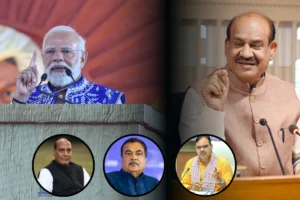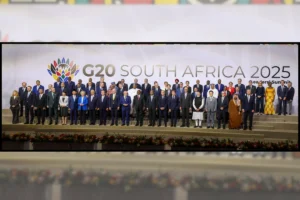
Amit Shah addressed the BJP's national convention in Delhi
Home Minister Amit Shah compared the upcoming Lok Sabha polls to the Mahabharata war, emphasizing Prime Minister Narendra Modi’s leadership in the BJP-led camp focused on the country’s development. Speaking at the BJP’s national convention in Delhi, Shah criticized the opposition “INDIA alliance” for its dynastic and appeasement politics.
He highlighted the presence of “2G, 3G, and 4G” parties in the opposition, indicating successive generations of family rule. Shah praised PM Modi’s efforts in uplifting all sections of society and enhancing India’s global stature, expressing confidence in his re-election for a third term.
Also Read: Eight Jharkhand Congress MLAs Arrive in Delhi, Request Removal of Four Ministers
Shah contrasted PM Modi’s focus on the poor and national development with the opposition’s aspirations for familial political succession. He criticized opposition leaders like Sonia Gandhi, Sharad Pawar, Lalu Prasad, and M K Stalin for prioritizing family interests over national welfare.
Speaking at the @BJP4India National Convention, New Delhi.#BJPNationalCouncil2024 https://t.co/vT1w2yBBzY
— Amit Shah (Modi Ka Parivar) (@AmitShah) February 18, 2024
The government’s initiatives have uplifted the living standards of 60 crore impoverished citizens previously neglected in the development process, Shah noted. He accused the opposition of obstructing progressive reforms, such as the repeal of Article 370 and the ban on triple talaq, due to their denial and appeasement politics.
Also Read: Amid Thousands Of Israelis Protest, Netanyahu Rejects Calls For Early Election
Highlighting the Congress’s refusal to attend the Ram temple consecration ceremony, Shah criticized its appeasement policies. He emphasized that PM Modi’s rise from humble beginnings, as the son of a tea seller, disproves claims of familial politics within the BJP.
Overall, Shah’s address underscored the BJP’s commitment to inclusive development and criticized the opposition’s dynastic and obstructive politics.
To read more such news, download Bharat Express news apps






















